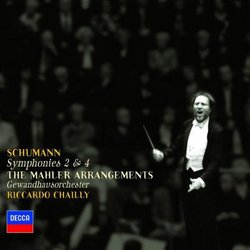| All Artists: Robert Schumann, Riccardo Chailly, Gewandhaus Orchestra Title: Schumann: Symphonies Nos. 2 & 4 (The Mahler Arrangements) Members Wishing: 0 Total Copies: 0 Label: Decca Original Release Date: 1/1/2007 Re-Release Date: 2/13/2007 Genre: Classical Styles: Opera & Classical Vocal, Symphonies Number of Discs: 1 SwapaCD Credits: 1 UPC: 028947583523 |
Search - Robert Schumann, Riccardo Chailly, Gewandhaus Orchestra :: Schumann: Symphonies Nos. 2 & 4 (The Mahler Arrangements)
 | Robert Schumann, Riccardo Chailly, Gewandhaus Orchestra Schumann: Symphonies Nos. 2 & 4 (The Mahler Arrangements) Genre: Classical
CHAILLY/GEWANDHAUSORCHESTER |
Larger Image |
CD DetailsSynopsis
Product Description CHAILLY/GEWANDHAUSORCHESTER Similarly Requested CDs
|
CD ReviewsElegant, Mesmerizing Performances of Mahler's Edited Version John Kwok | New York, NY USA | 02/28/2007 (5 out of 5 stars) "Distinguished composer and conductor Gustav Mahler was not alone among his contemporaries in "editing" works composed by earlier great composers such as Beethoven and Schumann (A classic case in point is the fate of most, if not all, of Bruckner's symphonies, which received major, unauthorized revisions during - and after - the composer's life.). Critic David Matthews observes in the liner notes for this recording that Mahler's revisions of Schumann's symphonies were essentially minor, remaining fateful to Schumann's artistic vision, without trying to impose Mahler's own personal stamp on these scores. Matthews gives a splendid overview of Mahler's corrections, pointing out exactly where changes were made in Schumann's original orchestrations of both scores. After hearing this recording I couldn't help but utter "Wow". The venerable Leipzig Gewandhaus Orchestra has rarely sounded better - either live or in a recording - under the magnificient conducting of its new music director Riccardo Chailly. Clearly, in a short time under his inspired directorship, the orchestra is now regarded by many as one of Europe's five great orchestras. Mahler's edited versions of these two Schumann symphonies truly emphasize this orchestra's strengths; most notably a warm, lush, vibrant Central European tone for its string sections, and vibrant, precise intonation from both the winds and horns. Chailly and his new orchestra have done a fine job demonstrating why Mahler's edited versions of these two Schumann symphonies should be heard more often in concert performances (I might add that this is yet a good reason wny the Mahler-edited version of Schumann's 1st Symphony will be performed at Carnegie Hall during the orchestra's latest North American tour early next week.). Purists may cringe at some of the changes which Mahler has made to these scores, but I think most will agree that these are still splendid performances of Schumann's symphonies, coupled with elegant sound quality from Decca's sound engineers." Schumann heard brightly through Mahler's ears Santa Fe Listener | Santa Fe, NM USA | 03/13/2007 (5 out of 5 stars) "Even after pioneering efforts in the Sixties by Leonard Bernstein, who set out to disprove the dusty claim that Schumann's symphonic orchestrations are awkward or even botched, the accusation kept cropping up. Then the authenticity movement helped restore the four symphonies to what Schumann originally intended. Now, by a quirk of taste, Chailly is reverting back to the old days of tampering with the score, not to diss the composer but to let us hear what another genius (and supreme orchestrator), Mahler, had to say. What one hears immediately is that Mahler thinned out the many doublings of string lines, rendering them leaner and cleaner. In the process he allowed wind solos to emerge more clearly. After hearing a concert featuring the First "Spring" Sym., the NY Times reviewer commented that Mahler makes Schumann sound like early Beethoven. Well, not on this CD, but the opened-up texture is highly noticeable. You'll hear woodwind chords that used to be underwater and less 'fatness' in the orchestra's timbre. Call it Schumann in light of Mendelssohn. Chailly has suddenly revitalized the dogged old Leipzig Gewandhaus, earning raves everywhere, and quite deservedly. The ensemble is sharp, alive, and constantly grabbing the listener's attention in these electric readings of Sym. 2 and 4, which are the best we've gotten in a decade. If you want to hear Mahelr's Schumann done in sparkling performances, this CD is highly recommended." Brilliant Performances---and Mahler's Arrangements M. C. Passarella | Lawrenceville, GA | 02/17/2008 (5 out of 5 stars) "My take here is a little different from that of other reviewers. Whereas Mahler may have clarified the mud at certain points (and as the notes to this recording say, Mahler curiously didn't even touch the doublings of wind and strings that are thought of as Schumann's most egregious failing in reworking his Symphony No. 4 , 1841/1852), at others Mahler misjudges, I think you'll agree, if you know and love these scores well enough. For example, he makes a strange cut in the coda of No. 2 just where Schumann builds to a big Romantic peroration, and there are a Brucknerian luftpause or two thrown in for bad measure. These will leave knowledgeable listeners scratching their heads. But otherwise, the changes are subtle and if not essential, then mostly for the good. Woodwinds make their points more tellingly here and there, and balances in general sound more judicious.
(It's a shame, by the way, that while he was at it, Mahler didn't cobble together the truly definitive Schumann Fourth Symphony. This would start with Schumann's 1841 edition of the symphony, preferred by Brahms and just about everybody else who has really listened to the two versions, and for the two big transitions in the work--slow introduction to First Movement proper and Scherzo to Finale--substitute the more successful versions of these sections from the 1852 edition. Schumann learned a lot about building tension in an orchestral piece in the years between 1841 and 1852. But during the same period, he also became a beleaguered conductor who, in order to get more surefire attacks from his orchestra, decided to double the winds and strings in his later edition of the symphony. The result? The listener strains for evidence that the woodwinds have even been invited to the party.) The trouble with Mahler's interventions, beside the fact that they represent questionable musical practice in the first place, is that the authentic-music movement has shown that the original orchestrations were not as inept as many thought. It's just that Schumann's scoring doesn't work well when played by the late-Romantic orchestra that we hear in concert halls of today. Unless, of course, a great late-Romantic composer comes along and makes the proper adjustments to the Schumann sound so that it all does work. John Elliott Gardiner, in his essential recording of the complete symphonies, went the other route, of course, stripping the orchestra down to the Mendelssohn-era one that Schumann would have known. And, of course, the original orchestrations work much, much better, even if Schumann won't ever be considered a master orchestrator. So what of the current recording by Chailly and the Gewandhaus Orchestra? Two things need be said. One, it is fascinating to hear Mahler's thoughts on music he clearly loved and felt he had to "improve" before bringing it before the public in his guise as conductor. Two, and more importantly, these are brilliant performances in any event. Chailly is one of the two or three consistently fine conductors recording today, and the Gewandhaus (Mendelssohn's orchestra, after all) sounds like a hand-in-glove fit for this assignment. A case in point is the "Genoveva Overture." Mahler didn't tidy up this work for Schumann, and yet it makes as grand an impression as the symphonies do--maybe grander, in that magnificently brassy peroration at the end of the coda. I've never heard it more thrillingly played, and this is one of my favorite Schumann pieces. " |

 Track Listings (9) - Disc #1
Track Listings (9) - Disc #1

